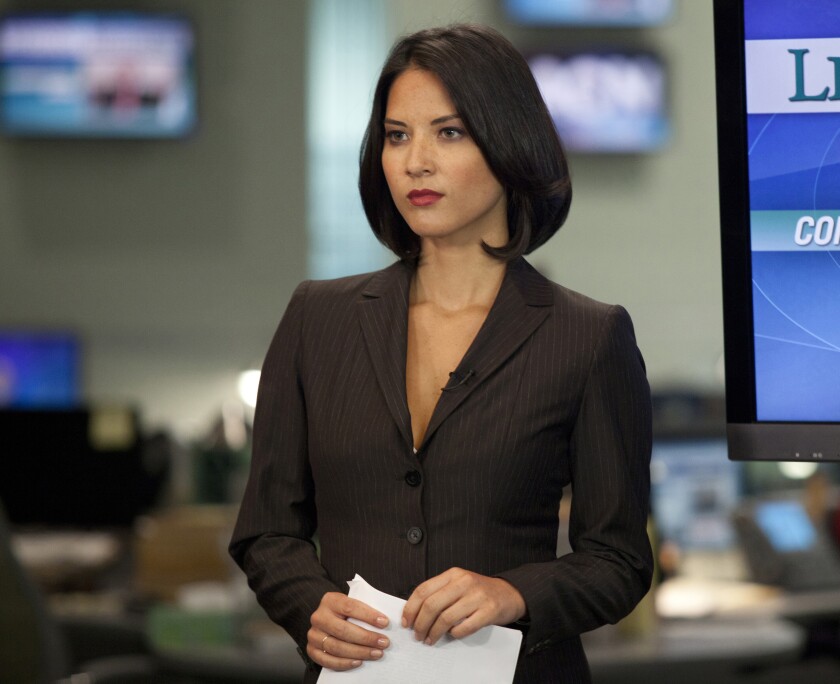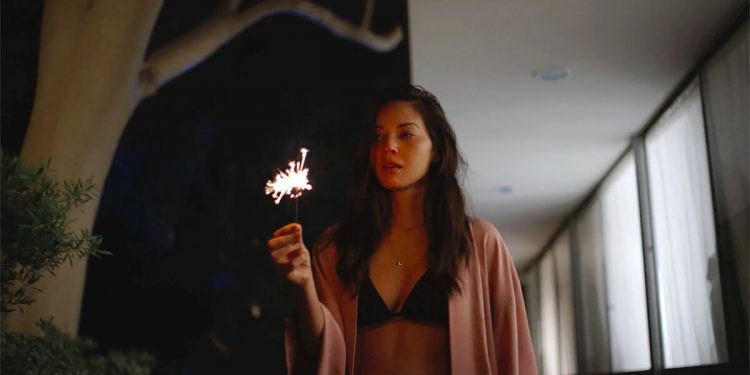Olivia Munn has a lot on her mind these days. Air ducts, mostly.
Should she get them cleaned before her baby arrives? That’s a thing people do, right? What about the rest of the house? Should she invest in a good air purifier? How about one for each room? Someone told her that was a good idea. But how has she been living without them until now?
The 41-year-old actor, who is pregnant with her first child, is feeling overwhelmed by impending motherhood and the cascade of worry it has unleashed.
“My brain hasn’t hasn’t been able to settle because it’s just a constant feeling of you’re doing it wrong,” says Munn, speaking via video conference from a room filled with half-open boxes. She apologizes for the disarray, explaining that it’s the only place she can escape the noise of the tree-trimmers next door. “People tell me the baby will come and then you’ll figure it out. But that doesn’t stop the anxiety I feel right now.”
Newsletter
The complete guide to home viewing
Get Screen Gab for weekly recommendations, analysis, interviews and irreverent discussion of the TV and streaming movies everyone’s talking about.
Enter email address
Sign Me Up
You may occasionally receive promotional content from the Los Angeles Times.
Munn has logged on to discuss her role in “Violet,” a stylized psychological drama about a high-powered film executive who projects an aura of steely poise but is plagued by a hyper-critical inner voice ( Justin Theroux). Written and directed by Justine Bateman, the film, now available for streaming, follows Munn’s Violet as she tries to silence the “committee” in her head and stop living in fear of what others think about her — a journey the actor can relate to. Especially lately.
Munn has had a dizzying few months in the spotlight thanks to her relationship with comedian John Mulaney. The couple went public in May, days after he confirmed reports that he was divorcing his wife, Anna Marie Tendler, and a few months after he concluded a stint in rehab. Then in September, Mulaney went on “Late Night With Seth Meyers” to confirm what many already suspected: The couple was expecting a baby.
Olivia Munn in the 2021 drama “Violet.”
(Mark Williams / Relativity Media)
The warp-speed romance — and the turbulent circumstances surrounding it — set off a frenzy online. Fans who were deeply invested in Mulaney’s marriage to Tendler, an artist who makes handsewn Victorian lampshades and was often mentioned in his stand-up act, turned to social media to voice their dismay over the breakup and, in many cases, to criticize Munn.
This freakout sparked an equally impassioned backlash against “parasocial relationships,” or the false sense of intimacy fans often feel toward their favorite celebrities. (The previously obscure psychological term reached its peak in Google Trends the week the pregnancy was confirmed.) Speculation about their relationship status continues to run rampant online, fueled by random TikTok users and unvetted blind items on Deuxmoi, the free-wheeling celebrity gossip Instagram account.
“It’s definitely not foreign for me to have people speculate incorrectly about things and to have rumors run rampant in one way,” says Munn, who has been inspiring strong opinions since she entered the public eye 15 years ago and whose personal life often gets more attention than work that spans prestige TV, studio action movies and microbudget indies.
“They think they know our relationship so well. When in reality, they don’t. There’s no way anyone could know what any of his relationships were or what our relationship is,” she says — speaking in the present tense, for the record.
Munn says she has long wrestled with the question of how much to respond to her detractors. She seems torn between a natural proclivity for sharing and an understandable need to protect herself from another internet pile-on. Her wording is cautious and halting, especially when she starts to tiptoe around specific rumors relating to her and Mulaney. No wonder she is nervous: Everything she says is bound to be dissected by thousands of strangers on Reddit.
She has chosen not to refute specific claims because it will “feed into a narrative that’s just not true,” especially since people tend to “ignore really specific public signs and actions that completely contradict the false narrative,” she says. “For whatever reason, it’s easier to blame me.”
“If I try to say anything, I run the risk of being called messy or not telling the truth,” she adds. “The only way to win, for me, is to pull back and to not play the game at all.”
For Munn, “pulling back” means she hasn’t shared her pregnancy online or gone through one of contemporary celebrity’s most sacrosanct rituals, the Instagram baby bump reveal. She hasn’t invested in cute maternity clothes, she explains, instead repeatedly washing and wearing the same ASOS sweatshirt and Asian American Girl Club sweatpants she has on during this interview.
“There’s this vulnerability that I feel that makes me want to … just turn everything off,” she says. “I’d rather close the door to that and just take care of myself and my baby.”
In contrast, Mulaney has already incorporated his new relationship into his stand-up act. A few days after confirming the pregnancy on “Late Night,” he opened a performance in Bethel, N.Y., by joking about the difficulty of telling people you’re having a baby and getting “mixed reviews.”
“He’s so funny, and he’s so articulate, and he’s so smart. The first time he made that joke. I remember laughing. I’d be with him on the road, and I would hear him tell this joke, and I did feel a sense of healing with it,” she says. “It’s hard to be pregnant for the first time and have anybody say anything besides, like, ‘Congratulations.’”
Munn earned a fanboy following as the co-host of “Attack of the Show!,” an irreverent variety show focused on gaming culture, beginning in 2006. In segments with names like “Olivia’s Rack,” she cultivated a sexy geek persona that eventually led to an audition for “The Daily Show.” In 2010, she was cast as the show’s “senior Asian correspondent” and became the first new female correspondent in seven years.
What might have been hailed as a breakthrough instead sparked a debate about the role of women in late-night TV — and “The Daily Show” in particular. A number of feminist bloggers argued at the time that Munn was chosen because of her looks, her ogling male fans and her willingness to jump into giant cream pies while dressed as a French maid, not her comedy chops.
“It was very much like, ‘Yeah, we want diverse women [on “The Daily Show”], but not that woman,’” Munn recalls. “Because I was on the cover of Maxim, it was like, ‘How does this girl go on to “The Daily Show?”'”
She suspects things would be different today: “There are many women who really embrace their sexuality, especially with social media, and are still seen as smart and don’t feel like they have to wear a cloak to be taken seriously.”
Munn says scrutiny from “outside voices” during this chapter of her career intensified her already persistent self-doubt. She’d read comments in online forums and tries not to take them personally, but “sometimes it just hits the biggest insecurity inside of you,” she says.
And some rumors wouldn’t die, she says, because they were more “fun” to believe than the reality. Case in point: In 2011, director Brett Ratner falsely claimed that he had slept with her. Even though Ratner quickly recanted, the story lingered for years and, she believes, tarnished her name.
No one paid attention to the correction, she says, because “they liked the lie instead. The dynamic is believe the guy no matter how gross he is, and believe that the girl had to take every shortcut to get there.” It was particularly infuriating because, as Munn told The Times in 2017, Ratner allegedly masturbated in front of her on a film set years earlier.
She followed “The Daily Show” with a role as a brilliant but neurotic financial reporter in “The Newsroom,” Aaron Sorkin’s polarizing cable news drama. She mastered the show’s screwball banter and played the part of a gorgeous oddball with two PhDs convincingly, even if to some it served as evidence of Sorkin’s supposed “woman problem.”
“Olivia is an outspoken woman. She’s a brilliant and talented actress who also happens to be a knockout, so of course that’s going to drive a few people crazy,” says Sorkin, who had taken notice of Munn when she moderated a panel for “The Social Network.” “Before I knew the full extent of her abilities, I tried to put the ball where she could hit it. It quickly became clear that she could hit it anywhere I put it.”

Olivia Munn in Episode 2 of “The Newsroom.”
(HBO)
When Bateman was casting the title role in “Violet,” she says she wanted someone who seemed put together on the exterior. “A lot of the times in people’s lives they think, ‘I’ll be OK after I get this great job or get plastic surgery or move to this city or whatever it is.’ So part of why I am casting somebody who looks like [Munn], in a superficial way, is to quiet that argument. Here is somebody who is still having these negative thoughts” despite seeming to have everything, she says.
Munn was too intrigued to say no to “Violet,” but it was exhausting to reengage with a critical voice she’d long tried to banish: “There are scenes where I would break down crying. And when they would yell cut, I would still be emotional about it and I would just take some time to the side. And the AD would come over to me and be like, ‘We’re going to need you to stop crying.'”
“Violet” is the last film Munn completed before the pandemic. The critical voices reverberated in her head after production wrapped and continue as she tries to dodge the tabloid glare.
“To get to that state of having so much self-hatred and doubt — it’s not something you just shake off, at least for me,” she says, “because it is so true to how I’ve existed for so long.”
Source by www.latimes.com















































